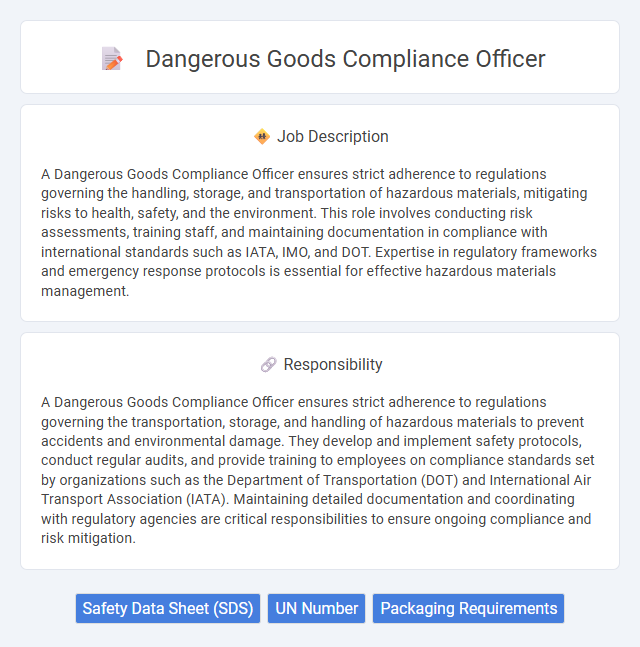
A Dangerous Goods Compliance Officer ensures strict adherence to regulations governing the handling, storage, and transportation of hazardous materials, mitigating risks to health, safety, and the environment. This role involves conducting risk assessments, training staff, and maintaining documentation in compliance with international standards such as IATA, IMO, and DOT. Expertise in regulatory frameworks and emergency response protocols is essential for effective hazardous materials management.
Individuals with strong attention to detail and an ability to remain calm under pressure are likely suited for the role of a Dangerous Goods Compliance Officer. Those who may struggle with high-stress environments or have difficulty following strict regulatory guidelines might find this job less suitable. Probable success in this position depends on a person's capacity to understand complex safety protocols and effectively communicate compliance requirements.
Qualification
A Dangerous Goods Compliance Officer must possess in-depth knowledge of international regulations such as IATA DGR, IMDG Code, and ADR standards. Essential qualifications include certifications like the Certified Dangerous Goods Safety Advisor (DGSA) credential, strong understanding of hazardous materials classification, and expertise in safety management systems. Proficiency in risk assessment, documentation accuracy, and regulatory audits ensures adherence to legal requirements and mitigates transport risks.
Responsibility
A Dangerous Goods Compliance Officer ensures strict adherence to regulations governing the transportation, storage, and handling of hazardous materials to prevent accidents and environmental damage. They develop and implement safety protocols, conduct regular audits, and provide training to employees on compliance standards set by organizations such as the Department of Transportation (DOT) and International Air Transport Association (IATA). Maintaining detailed documentation and coordinating with regulatory agencies are critical responsibilities to ensure ongoing compliance and risk mitigation.
Benefit
A Dangerous Goods Compliance Officer likely ensures organizations meet regulatory requirements, reducing legal risks and potential fines. They probably enhance workplace safety by overseeing proper handling and transportation of hazardous materials. This role may also increase operational efficiency and build organizational reputation through strict adherence to safety standards.
Challenge
A Dangerous Goods Compliance Officer likely faces the challenge of interpreting complex regulations that frequently change, requiring constant vigilance and adaptability. Managing the risks associated with hazardous materials transportation may demand precise documentation and rigorous training to prevent accidents. Ensuring compliance across diverse teams and maintaining safety standards could present ongoing difficulties due to varying operational environments.
Career Advancement
A Dangerous Goods Compliance Officer plays a critical role in ensuring the safe handling, storage, and transportation of hazardous materials in accordance with regulatory standards such as IATA, DOT, and OSHA. Career advancement opportunities often lead to senior compliance roles, specialized consultants, or managerial positions within logistics, shipping, or regulatory bodies. Gaining certifications like Certified Dangerous Goods Professional (CDGP) significantly enhances job prospects and paves the way for leadership responsibilities and higher salary brackets.
Key Terms
Safety Data Sheet (SDS)
A Dangerous Goods Compliance Officer ensures strict adherence to regulations governing hazardous materials, with a critical focus on Safety Data Sheet (SDS) management to guarantee accurate hazard communication. They oversee the preparation, review, and distribution of SDS documents, ensuring all chemical information complies with OSHA HazCom standards and GHS labeling requirements. Proficiency in interpreting SDS details facilitates proper handling, storage, and emergency response protocols, minimizing risks and enhancing workplace safety.
UN Number
A Dangerous Goods Compliance Officer ensures adherence to regulations governing the handling, storage, and transportation of hazardous materials identified by specific UN Numbers. They verify accurate classification, proper packaging, and documentation of dangerous goods according to the United Nations Recommendations on the Transport of Dangerous Goods. Expertise in UN Number assignment and regulatory standards is critical for minimizing safety risks and legal liabilities in supply chain operations.
Packaging Requirements
A Dangerous Goods Compliance Officer ensures adherence to strict packaging requirements to guarantee safe transportation and storage of hazardous materials. This role involves verifying that all packaging meets regulatory standards such as those set by the International Air Transport Association (IATA), the International Maritime Dangerous Goods (IMDG) Code, and local government regulations. Proper packaging prevents leaks, spills, and contamination, which are critical to maintaining safety and avoiding legal penalties.
 kuljobs.com
kuljobs.com